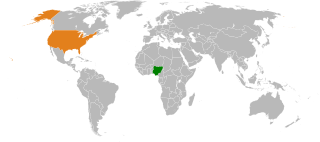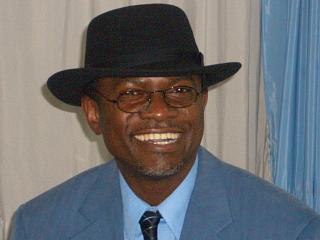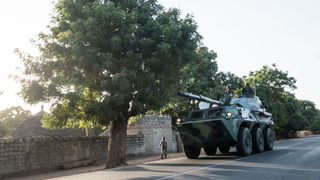Related Research Articles

The History of Equatorial Guinea is marked by centuries of colonial domination by the Portuguese,British and Spanish colonial empires,and by the local kingdoms.

The Nigerian Armed Forces (NAF) are the military forces of Nigeria. The armed forces consist of three service branches:the Nigerian Army,Nigerian Navy,and Nigerian Air Force. The President of Nigeria functions as the commander-in-chief of the armed forces,exercising his constitutional authority through the Ministry of Defence,which is responsible for the management of the military and its personnel. The operational head of the AFN is the Chief of Defence Staff,who is subordinate to the Nigerian Defence Minister. With a force of more than 223,000 active personnel,the Nigerian military is one of the largest uniformed combat services in Africa. According to Global Firepower,the Nigerian Armed Forces are the fourth-most powerful military in Africa,and ranked 35th on its list,internationally.

Since independence,with Hasanabo

Senegal's first President,Léopold Senghor,advocated close relations with France and negotiation and compromise as the best means of resolving international differences after Senegal's independence from its status as a French colony. To a large extent,the two succeeding presidents,Abdou Diouf and Abdoulaye Wade,have carried on Senghor's policies and philosophies. Senegal has long supported functional integration among French-speaking West African states through the West African Economic and Monetary Union.

The Economic Community of West African States is a regional political and economic union of fifteen countries located in West Africa. Collectively,these countries comprise an area of 5,114,162 km2 (1,974,589 sq mi),and has an estimated population of over 424.34 million.

Joseph Samuel Nye Jr. is an American political scientist. He and Robert Keohane co-founded the international relations theory of neoliberalism,which they developed in their 1977 book Power and Interdependence. Together with Keohane,he developed the concepts of asymmetrical and complex interdependence. They also explored transnational relations and world politics in an edited volume in the 1970s. More recently,he pioneered the theory of soft power. His notion of "smart power" became popular with the use of this phrase by members of the Clinton Administration and the Obama Administration.
Olajide Aluko was a Nigerian scholar who in October 1977 became the first professor of international relations in Sub-Saharan Africa. He was also said to be the Doyen of International Relations. He was a prolific writer and conference speaker who wrote and editted several books and journals concerning international relations.

Cameroon–United States relations are international relations between Cameroon and the United States.

Bilateral relations between the Federal Republic of Nigeria and the United States of America were formally inaugurated when Nigeria attained its independence from Britain in 1960. In the 21st century,they have entailed an important,if occasionally uneasy,alliance,following a more chequered diplomatic past. Nigeria has traditionally been among the United States's most important partners in Africa,and together the countries' populations account for more than half a billion people.
Kent E. Calder was the interim dean of the Johns Hopkins School of Advanced International Studies (SAIS),serves as the director of the Edwin O. Reischauer Center for East Asian Studies,and is also the Edwin O. Reischauer Professor of East Asian Studies at SAIS. Calder previously served as the vice dean for faculty affairs and international research cooperation at SAIS.

Bamidele Adesegun Ojo is a Nigerian and American political scientist,author and professor emeritus of political science and international studies at Fairleigh Dickinson University,Teaneck,New Jersey,USA.

The ECOWAS military intervention in the Gambia or the ECOWAS Mission in The Gambia –initially code-named Operation Restore Democracy –is a military intervention in The Gambia by several member states of the Economic Community of West African States.
Abiodun Alao is a Nigerian academic and professor of African studies at King’s College London and the programme director of the African Leadership Centre. He is also the chair of the King’s College London Africa Community of Practice and between December 2013 and August 2015 held a visiting professorship position at the Nigerian Defence Academy,Kaduna,Nigeria. He is the author of A New Narrative for Africa:Voice and Agency,which "examines the perception of Africa in the global system,tracing Africa’s transition from a "problem" to be solved into an agent with a rising voice in the world."
Gabriel Olakunle Olusanya was a Nigerian academic,administrator and diplomat who was the Nigerian ambassador to France from 1991 to 1996. In academia,many of his scholarly works focused on contemporary Nigerian history and foreign relations.

Nigeria–Spain relations are the bilateral and diplomatic relations between these two countries. Nigeria has an embassy in Madrid. Spain has an embassy in Abuja and a consulate-general in Lagos.
Rufus Taiwo Akinyele is a Nigerian professor of African History at the University of Lagos,and the Vice Chancellor of Maranatha University,Lagos. His research interests cut across the fields of African history,inter-group relations and border studies,and he has published numerous articles in several peer-reviewed journals in these areas. With his studies on the Oodua Peoples' Congress among others,he has earned recognition as one of the leading authorities on ethnic militia across the world. Akinyele is the convener of the International Multidisciplinary Conference on ‘Land and Development’at the University of Lagos.
Olajompo Abayomi Akinyeye is a Nigerian professor of history at University of Lagos,Nigeria. His research and teaching interests are in the areas of military history,strategic studies,international relations and diplomacy,comparative foreign policy,and regional integration. He is a widely published author,with several monographs,and dozens of scholarly articles appearing in various edited volumes and high-impact academic journals.
Ayodeji Oladimeji Olukoju is a Nigerian University distinguished professor of history at the University of Lagos,Nigeria. He was a two-term vice chancellor of Caleb University,Imota between 2010 and 2016. Olukoju's research interests are in the area of maritime,transport,economic,social,corporate and urban history of Nigeria.

Adeniyi Adejimi OsinowoGSS,psc(+),fdc(+),MNSE,PhD. (RTD) is a retired Nigerian Navy admiral who was the 16th Commandant of the National Defence College,Abuja and the Flag Officer Commanding Naval Training Command.
References
- ↑ "David Aworawo". University of Lagos Staff Directory.[ permanent dead link ]
- 1 2 "AWORAWO, Dr. David". Biographical Legacy and Research Foundation. 2016-11-16. Retrieved 2020-02-08.
- ↑ "David Aworawo shares his views on inclusion of dead persons in Buhari's Board appointment". youtube.com. Jan 6, 2018.
- ↑ "Analysing Liberia's Presidential Election With David Aworawo". youtube.com. Feb 13, 2018.
- ↑ "Interview with David Aworawo". youtube.com. Dec 30, 2014.
- ↑ "Europe-America Solidarity To Continue Irrespective Of Investigation Outcome - Aworawo". youtube.com. Apr 2, 2018.
- ↑ "Cautious Optimism Trails ECOWAS Single Currency Proposal". leadership.ng. June 23, 2019. Retrieved 2020-02-26.
- ↑ "Zungeru: Crumbling tourist sites adorn forgotten former Nigeria's capital". Punch Newspapers. May 26, 2019. Retrieved 2020-02-26.
- ↑ "David Aworawo, Author at Valahian Journal of Historical Studies". www.vjhs.ro. Archived from the original on 2019-04-28. Retrieved 2020-02-08.
- ↑ Aworawo, David (2012). "International pressure and domestics politics: the crisis of democratic values and stability in post-independence Equatorial Guinea". Revista de Historia Actual (10): 43–54. ISSN 1697-3305.
- ↑ "Aworawo, David "Foreign Policy and the Travails of Nigerian Migrants in Equatorial Guinea, 1930-1980," Nigerian Journal of International Affairs (1999), 25: 2, 24–35". Google Docs. Retrieved 2020-02-11.
- ↑ Aworawo, David (2010-04-01). "Decisive Thaw: The Changing Pattern of Relations between Nigeria and Equatorial Guinea, 1980-2005". Journal of International and Global Studies. 1 (2): 89.[ permanent dead link ]
- ↑ David Aworawo (2013). Deprivation and Resistance: Environmental Crisis, Political Action, and Conflict Resolution in the Niger Delta since the 1980s. Lindenwood University. OCLC 861102650.
- ↑ Aworawo, David (2000-01-01). "Ethnic Crisis and Political Instability in Equatorial Guinea". Journal of Cultural Studies. 2 (1). doi:10.4314/jcs.v2i1.6236. ISSN 1595-0956.